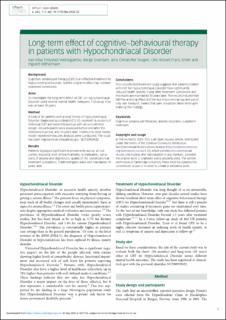| dc.contributor.author | Veddegjærde, Kari-Elise Frøystad | |
| dc.contributor.author | Sivertsen, Børge | |
| dc.contributor.author | Skogen, Jens Christoffer | |
| dc.contributor.author | Smith, Otto Robert Frans | |
| dc.contributor.author | Wilhelmsen, Ingvard | |
| dc.date.accessioned | 2021-02-22T11:08:44Z | |
| dc.date.available | 2021-02-22T11:08:44Z | |
| dc.date.created | 2020-09-07T12:45:47Z | |
| dc.date.issued | 2020 | |
| dc.Published | BJPsych Open. 2020, 6 (3), . | |
| dc.identifier.issn | 2056-4724 | |
| dc.identifier.uri | https://hdl.handle.net/11250/2729476 | |
| dc.description.abstract | Background
Cognitive–behavioural therapy (CBT) is an effective treatment for Hypochondriacal Disorder, but the long-term effect has not been examined extensively.
Aims
To investigate the long-term effect of CBT on Hypochondriacal Disorder using several mental health measures. Follow-up time was at least 10 years.
Method
A total of 50 patients with a long history of Hypochondriacal Disorder, diagnosed according to ICD-10, received 16 sessions of individual CBT and were followed up with an uncontrolled design. All participants were assessed before and after the intervention period, and 10 years later. Intention-to-treat mixed-model repeated-measures analysis were conducted. The study has been registered at clinicaltrials.gov: NCT00959452.
Results
Patients displayed significant improvements across all outcomes, including level of health anxiety, somatisation, symptoms of anxiety and depression, quality of life, somatisation at treatment completion. Treatment gains were well maintained 10 years later.
Conclusions
This uncontrolled treatment study suggests that patients treated with CBT for Hypochondriacal Disorder have significantly reduced health anxiety 1 year after treatment completion and the results are maintained 10 years later. The results indicate that CBT has a lasting effect, but the lack of a control group and use of only one therapist, means that care should be taken when generalising the findings. | en_US |
| dc.language.iso | eng | en_US |
| dc.publisher | Cambridge University Press | en_US |
| dc.rights | Attribution-NonCommercial-NoDerivatives 4.0 Internasjonal | * |
| dc.rights.uri | http://creativecommons.org/licenses/by-nc-nd/4.0/deed.no | * |
| dc.title | Long-term effect of cognitive–behavioural therapy in patients with Hypochondriacal Disorder | en_US |
| dc.type | Journal article | en_US |
| dc.type | Peer reviewed | en_US |
| dc.description.version | publishedVersion | en_US |
| dc.rights.holder | Copyright The Author(s) 2020. | en_US |
| dc.source.articlenumber | e42 | en_US |
| cristin.ispublished | true | |
| cristin.fulltext | original | |
| cristin.qualitycode | 1 | |
| dc.identifier.doi | 10.1192/bjo.2020.22 | |
| dc.identifier.cristin | 1827752 | |
| dc.source.journal | BJPsych Open | en_US |
| dc.source.40 | 6 | |
| dc.source.14 | 3 | |
| dc.identifier.citation | BJPsych Open. 2020, 6 (3), e42. | en_US |
| dc.source.volume | 6 | en_US |
| dc.source.issue | 3 | en_US |

